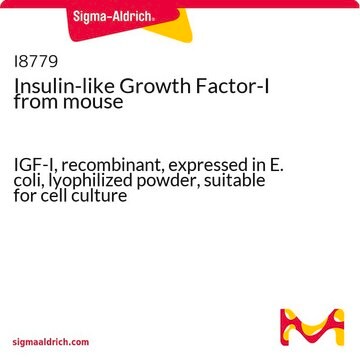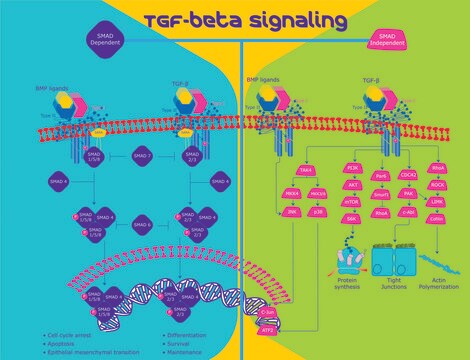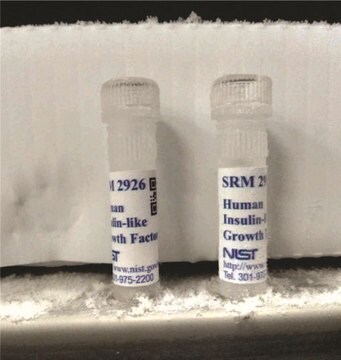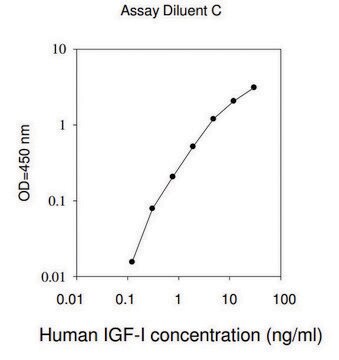GF306
IGF-I Protein, Human Recombinant Animal Free
The Insulin-like growth factor I protein(or IGF-1 protein), also known as somatomedin C, is the dominant effector of growth hormone & is structurally homologous to proinsulin. Manufactured using all non-animal reagents.
Synonim(y):
IGF-1, IGF1, Insulinlike Growth Factor I, Insulinlike Growth Factor 1, Mechano growth factor, Somatomedin-C, IGFI
Zaloguj sięWyświetlanie cen organizacyjnych i kontraktowych
About This Item
Kod UNSPSC:
12352202
eCl@ss:
32160405
NACRES:
NA.77
Polecane produkty
Poziom jakości
Próba
>98% (SDS-PAGE and HPLC)
zanieczyszczenia
<0.1 μg/mg protein endotoxin (<1EU/μg)
numer dostępu NCBI
numer dostępu UniProt
Warunki transportu
dry ice
Opis ogólny
Insulinlike growth factor I, also known as somatomedin C, is the dominant effector of growth hormone and is structurally homologous to proinsulin. The IGFs are mitogenic polypeptide growth factors that stimulate the proliferation and survival of various cell types including muscle, bone, and cartilage tissue in vitro. IGFs are predominantly produced by the liver, although a variety of tissues produce the IGFs at distinctive times. The IGFs belong to the Insulin gene family, which also contains insulin and relaxin. The IGFs are similar by structure and function to insulin, but have a much higher growth-promoting activity than insulin. IGF-II expression is influenced by placenta lactogen, while IGF-I expression is regulated by growth hormone. Both IGF-I and IGF-II signal through the tyrosine kinase type I receptor (IGF-IR), but, IGF-II can also signal through the IGF-II/Mannose-6-phosphate receptor. Mature IGFs are generated by proteolytic processing of inactive precursor proteins, which contain N-terminal and C-terminal propeptide regions. Recombinant human IGF-I and IGF-II are globular proteins containing 70 and 67 amino acids, respectively, and 3 intra-molecular disulfide bonds.
Product Source: E. coli
Specyficzność
Cross Reactivty
Mouse, Rat, Horse, Pig, Cow, Sheep, Monkey, Chicken, Tiger Salamander, Bacteria, Frog
Mouse, Rat, Horse, Pig, Cow, Sheep, Monkey, Chicken, Tiger Salamander, Bacteria, Frog
Zastosowanie
Research Category
Stem Cell Research
Stem Cell Research
Research Sub Category
Growth Factors & Receptors
Growth Factors & Receptors
Jakość
Bioactivity assay: The ED50 was determined by a cell proliferation assay using FDC-P1 cells is ≤ 2.0 ng/ml, corresponding to a specific activity of ≥ 5 x 105 units/mg.
Postać fizyczna
Product is filtered through a 0.2 micron filter before lyophilization.
Recombinant animal free human IGF-I is manufactured using all non-animal reagents
Przechowywanie i stabilność
Store at -20°C for up to 6 months from date of receipt.
Oświadczenie o zrzeczeniu się odpowiedzialności
Unless otherwise stated in our catalog or other company documentation accompanying the product(s), our products are intended for research use only and are not to be used for any other purpose, which includes but is not limited to, unauthorized commercial uses, in vitro diagnostic uses, ex vivo or in vivo therapeutic uses or any type of consumption or application to humans or animals.
This page may contain text that has been machine translated.
Kod klasy składowania
11 - Combustible Solids
Klasa zagrożenia wodnego (WGK)
WGK 3
Temperatura zapłonu (°F)
Not applicable
Temperatura zapłonu (°C)
Not applicable
Certyfikaty analizy (CoA)
Poszukaj Certyfikaty analizy (CoA), wpisując numer partii/serii produktów. Numery serii i partii można znaleźć na etykiecie produktu po słowach „seria” lub „partia”.
Masz już ten produkt?
Dokumenty związane z niedawno zakupionymi produktami zostały zamieszczone w Bibliotece dokumentów.
Jong-Ho Lee et al.
Nature communications, 8(1), 949-949 (2017-10-19)
Phosphofructokinase 1 (PFK1) plays a critical role in glycolysis; however, its role and regulation in tumorigenesis are not well understood. Here, we demonstrate that PFK1 platelet isoform (PFKP) is the predominant PFK1 isoform in human glioblastoma cells and its expression
Nasz zespół naukowców ma doświadczenie we wszystkich obszarach badań, w tym w naukach przyrodniczych, materiałoznawstwie, syntezie chemicznej, chromatografii, analityce i wielu innych dziedzinach.
Skontaktuj się z zespołem ds. pomocy technicznej







